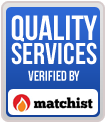When considering website hosting for your small business, know that your needs are very different from those of a larger business. For example, you won’t need as much space, nor will you need the same features. It’s important that your web hosting company suit your particular business needs. As a small business owner, you need to be able to look at different features that are available and determine which features are needed and which are unnecessary. The purpose of this article is to help you concentrate on key requirements of a good hosting company, thus making the choice easier. A bit of effort in your search for website hosting will help you avoid potential difficulties in the future.
1. Host company’s reputation.
First and foremost, consider the reputation of the web hosting company in the current market. Before making a decision on website hosting for your small business, check out the web host’s website. Look for awards and seals of approval; look especially for the Internet Better Business Bureau seal. Another route is to search the Internet for reviews of the different web hosting companies. Web hosting forums can provide this information for you. The absence of reviews is not necessarily a bad thing; most people only make the effort to review if they have had a bad experience, so a lack of reviews could be a good thing. One or two bad reviews are okay, but it’s best to avoid a company with bad reviews and no good reviews to balance it out.
2. Price.
Survey the packages available and select one that best meets the needs of your small business. Shared webhosting is popular because of the low and flexible price. Also, most webhosting companies offer annual plans. Whatever the price, remember that low fees do not automatically mean a great deal. Avoid the extremes of dirt cheap and expensive packages.
3. Bundles.
When deciding on a web hosting company, consider bundled software. You may encounter packages for content management, shopping cart and control panel software, and others. Deciding on the type of specialized software your small business needs should be done before a hosting commitment is made.
4. Security and Reliability.
If you are entrusting important and/or confidential data to your webhost, security and reliability are important. This data can include payment details, credit card numbers, website data, etc. Do some preliminary investigating such as talking to present customers of the webhost, especially those who have been with the host for a long period of time.
Reliability in a webhost equivocates to a high- recorded rate of customer satisfaction. Make a list of potential web hosting companies and search their reviews online. Note how long the customer writing the review has been associated with the webhost. A reliable web host will have long time customers.
5. Technical support.
How tech savvy are you? Do you feel confident in your ability to troubleshoot if something errs on your website? Large companies lose money when there are website malfunctions, but this can be devastating to small businesses. Having the option of technical support in your website hosting can alleviate these concerns, especially if the hosting support is available, friendly, useful, and responds to concerns quickly. Many web hosting companies have a twenty-four hour support line for when troubles arise.
6. Editing tools and script support.
Easy to use design and editing tools are offered by many web hosting companies. If your small business website is designed using Frontpage, it is important to make sure that the web hosting company they decide on supports FrontPage extensions. Another tip is to ensure that the web hosting company is compatible with other script languages, e.g. PHP, ASP, Perl.
7. Uptime and Speed.
A quality web hosting company should guarantee uptimes of 99 percent. This means that your website may only be unavailable 1% of the time. Small business owners should also check the information regarding their data center. It’s important to know that there are high-speed connections to the Internet backbone.
By knowing these seven important qualities of a potential web host, you will be prepared to choose your small business web- hosting provider. Don’t rush. Choose carefully; your website will depend on it.




